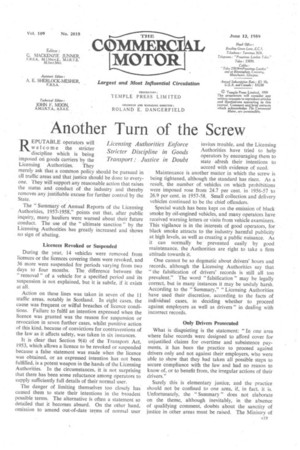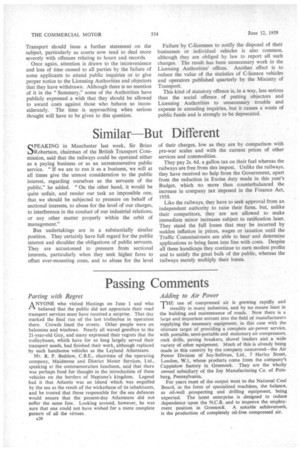Another Turn of the Screw
Page 21

Page 22

If you've noticed an error in this article please click here to report it so we can fix it.
REPUTABLE operators will welcome the stricter discipline which is being imposed on goods carriers by the Licensing Authorities. They merely ask that a common policy should be pursued in all traffic-areas and that justice should be done to everyone. They will support any reasonable action that raises the status and conduct of the industry and thereby removes any justifiable excuse for further control by the State.
The " SummarY,of Annual Reports of the Licensing Authorities, 19574958," points out that, after public inquiry, many hauliers were warned about their future conduct. The use of the "ultimate sanction" by the Licensing Authorities has greatly increased and shows no sign of abating.
Licences Revoked or Suspended During the year, 14 vehicles were removed from licences or the licences covering them were revoked, and 36 more were suspended for periods varying from two days to four months. The difference between the " removal " of a vehicle for a specified period and its suspension is not explained, but it is subtle, if it exists at all.
Action on these lines was taken in seven of the 11 traffic areas, notably in Scotland. In eight cases, the cause was frequent or wilful breaches of licence conditions. Failure to fulfil an intention expressed when the licence was granted was the reason for suspension or revocation in seven further cases, whilst punitive action of this kind, because of convictions for contraventions of the law as it affects safety, was taken in six instances.
It is clear that Section 9(4) of the Transport Act, 1953, which allows a licence to be revoked or suspended because a false statement was made when the licence was obtained, or an expressed intention has not been fulfilled, is a potent weapon in the hands of the Licensing Authorities. In the circumstances, it is not surprising that there has been some reluctance among operators to supply sufficiently full details of their normal user.
The danger of limiting themselves too closely has caused them to state their intentions in the broadest possible terms. The alternative is often a statement so detailed that it becomes absurd. On the other hand, omission to amend out-of-date terms of normal user invites trouble, and the Licensing Authorities have tried to help operators by encouraging them to state afresh their intentions to accord with evidence of need.
Maintenance is another matter in which the screw is being tightened, although the standard has risen. As a result, the number of vehicles on which prohibitions were imposed rose from 24.7 per cent. in 1956-57 to 26.9 per cent. in 1957-58. Small collection and delivery vehicles continued to be the chief offenders.
Special watch has been kept on the emission of black smoke by oil-engined vehicles, and many operators have received warning letters or visits from vehicle examiners. This vigilance is in the interests of good operators, for black smoke attracts to the industry harmful publicity at high levels, as well as creating a public nuisance. As it can normally be prevented easily by good maintenance, the Authorities are right to take a firm attitude towards it.
One cannot be so dogmatic about drivers' hours and records, although the Licensing Authorities say that "the falsification of drivers' records is still all too prevalent." The word " falsification " may be legally correct, but in many instances it may be unduly harsh. According to the "Summary," "Licensing Authorities have used their discretion, according to the facts of individual cases, in deciding whether to proceed against employers as well as drivers" in dealing with incorrect records.
Only Drivers Prosecuted What is disquieting is the statement: "In one area where false records were designed to afford cover for unjustified claims for overtime and subsistence payments, it has been the practice to proceed against drivers only and not against their employers, who were able to show that they had taken all possible steps to secure compliance with the law and had no reason to know of, or to benefit from, the irregular actions of their drivers."
Surely this is elementary justice, and the practice should not be confined to one area, if, in fact, it is. Unfortunately, the " Summary " does not elaborate on the theme, although inevitably, in the absence of qualifying comment, doubts about the sanctity of justice in other areas must be raised. The Ministry of Transport should issue a further statement on the subject, particularly as courts now tend to deal more severely with offences relating to hours and records.
Once again, attention is drawn to the inconvenience and loss of time caused to all parties by the failure of some applicants to attend public inquiries or to give proper notice to the Licensing Authorities and objectors that they have withdrawn. Although there is no mention of it in the "Summary," some of the Authorities have publicly expressed a wish that they should be allowed to award costs against those who behave so inconsiderately. The time is approaching when serious thought will have to be given to this question. Failure by C-licensees to notify the disposal of their businesses or individual vehicles is also common, although they are obliged by law to report all such changes. The result has been unnecessary work in the Licensing Authorities' offices. Another effect is to reduce the value of the statistics of C-licence vehicles and operators published quarterly by the Ministry of Transport.
This kind of statutory offence is, in a way, less serious than the social offence of putting objectors and Licensing Authorities to unnecessary trouble and expense in attending inquiries, but it causes a waste of public funds and is strongly to be deprecated.




















































































